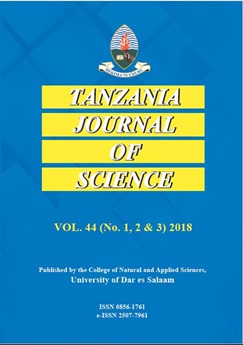Prerequisites for biocrops Up-Scaling II: An assessment of the vegetative method of propagation for oilferous plant species with potential for biodiesel production
Abstract
The rooting ability of hardwood cuttings from six selected non- edible oilferous plant species with potential for biodiesel production namely Telfairia pedata, Jatropha curcas, Excoecaria bussei, Croton macrostachyus, Croton megalocarpus and Ricinus communis was assessed on 4 different potting media i.e. forest top soil, sandy, clay and loamy soil. The proportion of cuttings that rooted were evaluated for the root numbers, root length, root dry weight, sprouting and callus formation. Complete randomized design (CRD) was adopted for the experiments and each of the species was replicated 4 times using 5 hardwood cuttings per plot (5 L capacity pots). An ANOVA was computed to test for the significance of variations between all treatments while Tukey-Kramer Multiple Comparisons test was used to test for the differences between treatment means. Jatropha curcas rooted well both in a non-mist propagator and open nursery pots, Telfairia pedata rooted only in the nursery pots, Excoecaria bussei sprouted in both non-mist propagator and open nursery pots but did not root throughout the entire experimental period of 3 months. Croton macrostachyus, Croton megalocarpus and Ricinus communis neither sprouted nor rooted calling for propagation methods other than using hardwood cuttings. Possibly all Excoecaria bussei cuttings which callused would have eventually differentiated into roots had the experiment been allowed to run for more than 3 months.
Key Words: Propagation; rootability; non-mist propagators; Excoecaria bussei; Telfairia pedata


